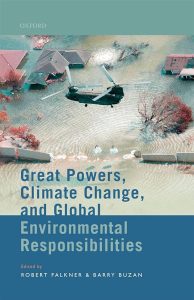In Great Powers, Climate Change, and Global Environmental Responsibilities, Robert Falkner and Barry Buzan bring together leading scholars from international relations and environmental politics to analyse the role of great powers in the international politics of climate change. Burak Elmalı deems it a groundbreaking work which opens up fertile avenues for further research.
Great Powers, Climate Change, and Global Environmental Responsibilities. Robert Falkner and Barry Buzan (eds.). Oxford University Press. 2022.
 Great Powers, Climate Change, and Global Environmental Responsibilities, edited by Robert Falkner and Barry Buzan, is a significant contribution to the realm of international relations and environmental politics. The book comprises thirteen chapters and presents an outstanding structure of foundational conceptual frameworks, subsequently exemplified by pertinent case studies. Particularly noteworthy are the initial two chapters, wherein the editors reconceptualise established power paradigms, accompanied by a detailed account of the concept of environmental “great powers”. The significance of this endeavour is twofold: first, it serves as the ground upon which the following chapters, which examine the roles of key actors such as the US, China, the European Union (EU), India, and Brazil, are established. Second, it effectively addresses theoretical gaps in the existing literature by introducing a novel dimension to prevailing understandings of power that can be applied to the securitisation of global climate change and multilateral environmental agreements.
Great Powers, Climate Change, and Global Environmental Responsibilities, edited by Robert Falkner and Barry Buzan, is a significant contribution to the realm of international relations and environmental politics. The book comprises thirteen chapters and presents an outstanding structure of foundational conceptual frameworks, subsequently exemplified by pertinent case studies. Particularly noteworthy are the initial two chapters, wherein the editors reconceptualise established power paradigms, accompanied by a detailed account of the concept of environmental “great powers”. The significance of this endeavour is twofold: first, it serves as the ground upon which the following chapters, which examine the roles of key actors such as the US, China, the European Union (EU), India, and Brazil, are established. Second, it effectively addresses theoretical gaps in the existing literature by introducing a novel dimension to prevailing understandings of power that can be applied to the securitisation of global climate change and multilateral environmental agreements.
In chapter three, Robyn Eckersley shifts the focus to the US, challenging the prevailing narrative on American environmental leadership. The chapter explores how environmental powers can adapt their approaches across issues, influenced by domestic factors like the presidential administration and Congress. This stance highlights the nuanced and issue-specific nature of environmental great power status. Eckersley examines the US’ stance on common but differentiated responsibilities and respective capabilities within the context of great powerhood, emphasising its somewhat restrictive position. This perspective gains relevance through the realist lens of international relations, which prioritises national interests over the expectations of environmental regimes, as in the case of the Byrd-Hagel Resolution and the subsequent US withdrawal from the Kyoto Protocol.
Eckersley examines the US’ stance on common but differentiated responsibilities and respective capabilities within the context of great powerhood, emphasising its somewhat restrictive position.
In the fourth chapter, Pichamon Yeophantong and Evelyn Goh analyse China’s approach to environmental issues, emphasising its selective and non-linear nature. China grapples with balancing its significant negative power with its aspiration to be seen as a responsible global actor. It positions itself as a defender of developing nations’ interests while actively participating in environmentally progressive areas like green finance and renewable energy, driven by national interests and global leadership ambitions. This chapter illustrates how China’s dual self-image is shaped by its strategic interests in the environmental arena. Particularly noteworthy is Xi Jinping’s decision in September 2022 to halt funding for coal plants under the Belt and Road Initiative (BRI), which, while excluding ongoing projects, applies to future investments, highlighting the complexities of China’s dualistic approach, influenced by legal loopholes.
China grapples with balancing its significant negative power with its aspiration to be seen as a responsible global actor.
The fifth chapter by Katja Biedenkopf, Claire Dupont, and Diarmuid Torney focuses on the EU’s role as a supranational environmental great power. This characterisation, distinct from conventional statehood, holds significance for two main reasons. Firstly, it highlights the EU’s identity as a “green great power” with collective responsibility, extending beyond nation-states. Secondly, it emphasises the EU’s unique attributes and status within the international community, aligning with the English School approach. Based on these insights, it can be deduced that the future trajectory of the EU’s positive power is crucial in reducing energy dependence on Russia. This desire is now actualised by leaning towards Liquified Natural Gas suppliers like Algeria and Qatar but, most importantly, through long-term initiatives like REPowerEU, indicating a persistent positive influence.
[…]it can be deduced that the future trajectory of the EU’s positive power is crucial in reducing energy dependence on Russia.
The sixth, seventh, and eighth chapters by Kathryn Hochstetler, Miriam Prys-Hansen and Alina Averchenkova, respectively, delve into the specific contexts of three BRICS countries: Brazil, India, and Russia, respectively. What unifies these nations is their tendency toward relatively limited and, at times, passive engagement with environmental regulations despite possessing considerable negative power. The case of India, explored by Prys-Hansen, serves as a particularly illustrative example, resembling China’s interpretation of the normative principle within the UN Framework Convention on Climate Change framework, known as “common but differentiated responsibilities and respective capabilities.” In these contexts, the primary determinant consistently revolves around economic considerations, making it highly improbable for developing countries to take proactive measures. These chapters underscore the prominence of national-level actions, emphasising that domestic constraints, largely driven by economic considerations, often impede the capacity for more progressive environmental initiatives. After its recent summit, BRICS’ growing presence in the global system might provide valuable insights into its role as an influential bloc in COP meetings, going beyond its economic might. This evolution could be a crucial source for observing the performance of great environmental powers in the Global South.
After its recent summit, BRICS’ growing presence in the global system might provide valuable insights into its role as an influential bloc in COP meetings, going beyond its economic might.
In subsequent chapters, the authors focus on adapting Falkner and Buzan’s foundational theoretical framework in other contexts. This involves considering the securitisation of environmental issues, the intricate interplay between responsibility and power, and the significance of multilateral agreements. Shirley Scott’s securitisation analysis within the UN Security Council context stands out, allowing environmental concerns to enter conventional foreign policy and global discourse. This aspect is crucial, as climate change can shift threat perceptions, impacting the operational capabilities of Western powers like the United States and engaging Global South actors, including small island states facing existential threats. While the dynamic, multi-actor process suggests a move toward solidarity, as detailed by Sanna Kopra in the tenth chapter, concrete action underscores the influence of national interests on the initiatives of great environmental powers.
[…]climate change can shift threat perceptions, impacting the operational capabilities of Western powers like the United States and engaging Global South actors, including small island states facing existential threats.
Overall, Great Powers, Climate Change, and Global Environmental Responsibilities is a seminal work. It expertly delineates the concept of great environmental power, its positive and negative dimensions, and ensuing responsibilities. It has the potential to reposition global climate change from a sidelined issue to a central focus in foreign policy agendas. This step requires departing from traditional securitisation and embracing what Buzan and Wæver wrote in 2009 about security constellations.
Two crucial avenues for research development emerge from the book. Firstly, while it is important to expand our perspective beyond nation states as in the case of the EU, the conceptual ground should also be incorporated into Robert Keohane and David Victor’s (2010) “regime complex” discussions that focus on the intersections of climate change with domains such as global trade, finance, and multilateral bodies. Secondly, operationalising the concepts of positive power, negative power, and great environmental power to create indexes similar to democracy and corruption perception indexes to assess great “powerhood” within an environmental context could provide valuable insights into the dynamics of ecological responsibility highlighted in the book. Future research should give serious consideration to these aspects.
Note: This review gives the views of the author, and not the position of the LSE Review of Books blog, or of the London School of Economics and Political Science. The LSE RB blog may receive a small commission if you choose to make a purchase through the above Amazon affiliate link. This is entirely independent of the coverage of the book on LSE Review of Books.
Image Credit: Alzay on Shutterstock







